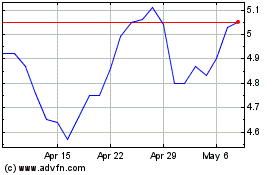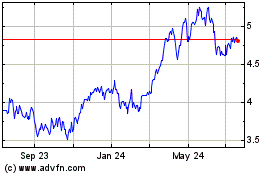By Gunjan Banerji and Julia-Ambra Verlaine
This article is being republished as part of our daily
reproduction of WSJ.com articles that also appeared in the U.S.
print edition of The Wall Street Journal (April 28, 2020).
Investors are snapping up complex securities linked to some of
the markets deemed most vulnerable to the coronavirus-driven
economic slump, a sign that the yearslong reach for yield has
survived the market shock.
Faced with withering share prices and falling yields on safe
government bonds, portfolio managers are seeking out returns in an
array of strategies that in some instances take them into esoteric
corners of the financial markets. One popular spot is the market
for asset-backed securities, typically bonds whose payments to
investors are generated by the cash flows collected from a large
pool of car loans, property leases or other agreements.
Despite worries about a recession ahead and falling consumer
spending, demand for bonds backed by U.S. auto loans has
outstripped supply in recent days, bankers and investors said. A $1
billion bond marketed this month by Santander Consumer USA was sold
at yields lower than initially expected, people familiar with the
deal said.
In another closely watched deal, Dell Technologies Inc. last
week sold approximately $1.1 billion in debt backed by leases on
equipment to big and small companies across the country, including
computers and servers. Meanwhile, sales of so-called structured
products geared toward individual investors -- including bets on
stocks repackaged into bonds -- hit a decade high in March.
The data show that individual and institutional investors alike
remain willing to put money to work, even as uncertainty around the
economic impact of the coronavirus pandemic lingers. Many analysts
and traders said they have been struck by the extent to which some
of these markets appear on the road to recovering their full
health, just weeks after trading was frozen with the news that many
jurisdictions across the U.S. had imposed stay-at-home orders and
similar measures.
"I'm so shocked that we're here so fast," said Paul Norris, head
of structured products at Conning, who oversees $20 billion in
securitized debt. He attributed the rapid bounceback to the Federal
Reserve's expansive support for markets, saying he bought
asset-backed securities recently because the Fed-inspired rally
"created an opportunity for a lot of investors."
This week investors will get fresh reads on consumer spending
and confidence as well as gross domestic product for the first
quarter. A measure of consumer sentiment for April had its sharpest
single-month decline on record, the University of Michigan reported
Friday.
The current market environment is confounding for many
investors, with share prices rebounding smartly in the U.S. even as
bond yields remain near record lows and oil prices this month
briefly fell below zero. Accordingly, investments that promise
higher and steadier returns remain popular.
"That's a constant question from not just individual clients but
institutional clients: Where do we go for yield?" said Mark Grant,
chief global strategist of fixed income at B. Riley FBR Inc.
"People want yield, they want income, they want money coming
in."
Issuance year to date in asset-backed securities stands at $55
billion, according to JPMorgan Chase & Co. research analysts.
That is down from $77 billion over the same period last year, but
the pipeline for more deals is filling up.
The market for asset-backed securities was shut down for nearly
four weeks, beginning in mid-March. That was a shorter period
compared with the depths of the financial crisis, when investors
stopped buying securitizations for months until the Fed's Term
Asset-Backed Securities Loan Facility, or TALF, was up and
running.
"Sentiment is certainly better than in 2008," said Marty Attea,
head of securitized products origination at Barclays. "During the
financial crisis, securitization was the epicenter of the
earthquake, and it rippled through the financial machinery. This
time asset-backed securities are along for the ride with the rest
of the market -- they are a casualty, not a cause."
About $8 billion of subprime auto debt has been issued so far
this year, according to JPMorgan, compared with $10.1 billion
during the same period last year. A total of about $30 billion was
issued in 2019, near a decade high.
When Santander and GM Financial issued bonds backed by auto
loans this month, demand for the debt outstripped supply, according
to bankers at Barclays who led the deals. They were the first to
hit since the pandemic rattled some of the safest corners of debt
markets, including Treasurys and high-grade corporate bonds.
The nation's largest used-car retailer, CarMax Inc.,
successfully priced bonds a week later.
Enrique Mayor-Mora, chief financial officer of CarMax, said the
company was "pleased with investor demand," which allowed it to
sell more debt than it had originally planned.
The heavy interest comes even though the market has grown
riskier in light of the coronavirus pandemic. Subprime auto debt
including some of Santander's is backed by some of the riskiest
borrowers with typically lower credit scores.
Santander recently disclosed that there was a sharp uptick in
the number of people seeking payment extensions on their auto
loans. About 7.5% of the loans backing its debt had received a
payment extension in March, up from roughly 1% in February,
according to JPMorgan. Fitch Ratings recently said that its outlook
on the auto-loan sector has worsened in light of the coronavirus
pandemic.
Investors have also piled into exchange-traded products offering
steady income and dividends, FactSet data show, ranging from funds
promising consistent stock returns to risky exchange-traded notes
offering payouts tied to commodities.
Issuance of structured products geared toward individual
investors hit a decade high in March, the most volatile month in
the stock market's history, according to industry publication
Prospect News. These types of products are built by banks using
derivatives and often end up in the hands of individual investors
who receive a future payout based on the performance of such assets
as stocks or commodities.
In a corner of this market, so-called auto-callable notes have
been popular this year, with issuance topping $13 billion,
according to data from mtn-i. A rise in share prices can trigger
redemption of the notes.
In the past, some of the auto-callable notes tied to big
technology companies have fallen short in delivering the high
returns investors expect.
Still, bankers said the recent market environment -- marked by
big swings up and down across markets -- tends to draw people to
the products.
Write to Gunjan Banerji at Gunjan.Banerji@wsj.com and
Julia-Ambra Verlaine at Julia.Verlaine@wsj.com
(END) Dow Jones Newswires
April 28, 2020 02:47 ET (06:47 GMT)
Copyright (c) 2020 Dow Jones & Company, Inc.
Banco Santander (NYSE:SAN)
Historical Stock Chart
From Mar 2024 to Apr 2024

Banco Santander (NYSE:SAN)
Historical Stock Chart
From Apr 2023 to Apr 2024
